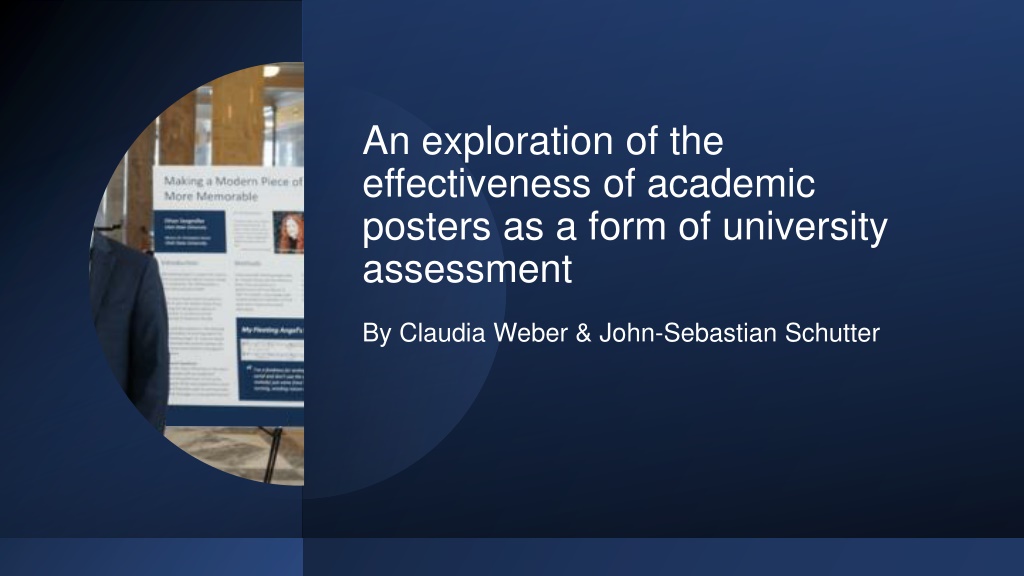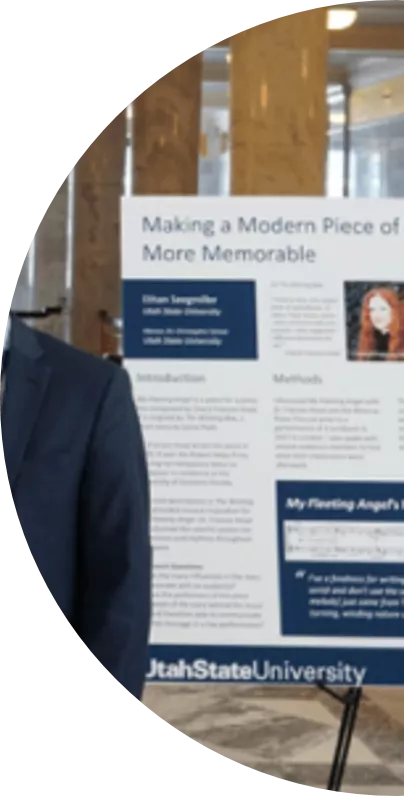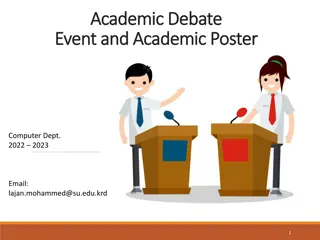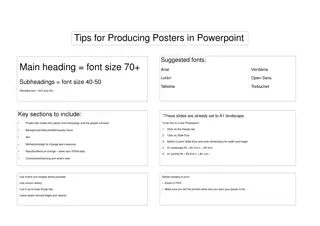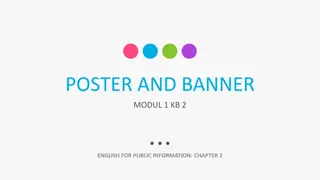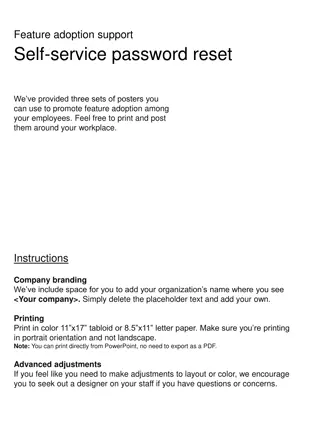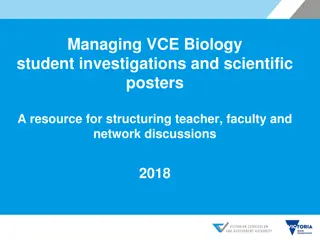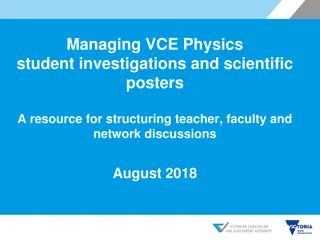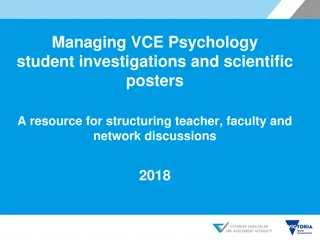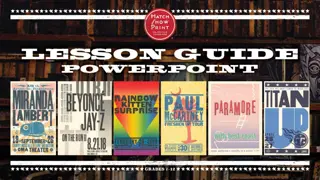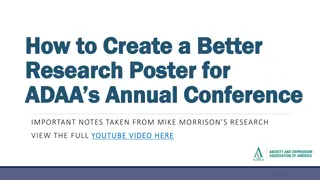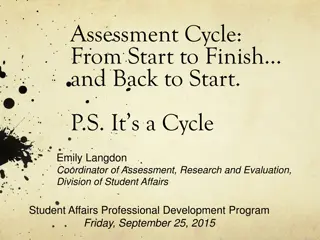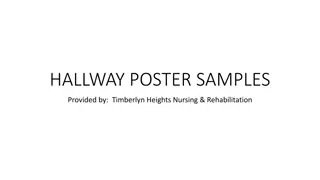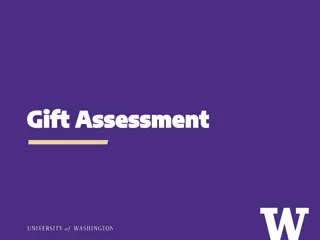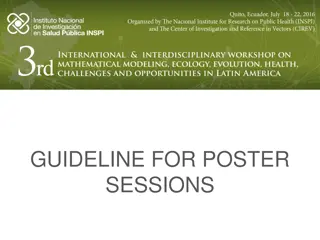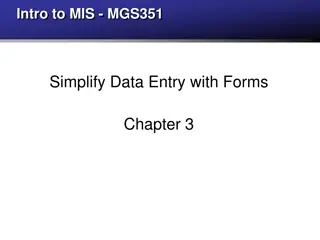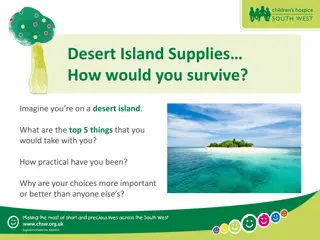posters as a form of university assessment
This study explores the effectiveness of academic posters as a form of university assessment, considering factors such as academic integrity, engagement, critical thinking, convenience, scaffolding, research skills, group work, organizational skills, communication skills, and subject knowledge. The research delves into related literature, sample size analysis, and themes identified in the study, emphasizing the role of posters in enhancing student learning outcomes and assessment practices in higher education.
Download Presentation

Please find below an Image/Link to download the presentation.
The content on the website is provided AS IS for your information and personal use only. It may not be sold, licensed, or shared on other websites without obtaining consent from the author. Download presentation by click this link. If you encounter any issues during the download, it is possible that the publisher has removed the file from their server.
E N D
Presentation Transcript
An exploration of the effectiveness of academic posters as a form of university assessment By Claudia Weber & John-Sebastian Schutter
Motivation/ Rationale IMPROVE ASSESSMENT IN PRE- MASTERS COURSES BUILD TIES ACROSS OTHER DISCIPLINES WITHIN THE UNIVERSITY
Summers (2005): assessment in HE needs to be reliable, cost-effective, efficient, fair, useable by lecturers and useful to employers Angelov (2020): shift to multi-modality in HE assessments to prevent cheating and plagiarism Marchante and Herrero (2022): academic posters promote critical thinking, information retrieval and communication skills, part of participatory-reflective learning which reinforces cooperation and problem-solving D Angelos (2022): Posters are suitable for classes of all sizes, promote collaborative learning, encourage creativity and independent thought, develop research and communication skills, and ease the grading burden on instructors MacIntosh-Murray (2007): challenging hybrid, difficult to do well. It is expected to stand alone and speak for itself Literature Review
Sample size: 33 lecturers contacted (SoSS, EBS, EGIS, MACS), received 18 replies, 11 rejections (incl. Maths, Business and Economics), conducted 6 interviews, 1 scheduling conflict Interviews: In-person/ Teams (average length 30 mins, range: 24-41 mins) Methodology Analysis: Population: Qualitative: Discourse Analysis w emerging themes Quantitative: Descriptive statistics Actuarial Sciences, Astrophysics, Physics (2), Chemical Engineering, Chemistry
Themes POSTER ASSESSMENT AS a means of controlling for plagiarism/AI collusion. Academic Integrity a more engaging type of assessment. Engagement a more effective form of assessing the student s critical thinking skills. Critical Thinking a more convenient form of assessment (easier to mark/moderate). Convenience a preparation for/in conjunction with other coursework. Scaffolding a means of developing students research skills. Research skills a means of promoting group work. Group Work a means of developing organisational and time management skills. Organisational Skills a means of testing the student s communication skills. Communication Skills a means of testing the student s subject knowledge. Subject Knowledge
" it was kind of like a celebratory thing, like we're done with the projects, this sort of food and everyone sort of charts and sees what everyone's achieved. And actually, most of the students actually found this, in my opinion, as far as I can tell, they found it quite positive. And certainly my students really enjoyed it because. You know, they they could show off a little bit what they have done and and talk about it and feel a little bit of pride in that work ... " a more engaging type of assessment "So I would say it's pretty good overall because there's, there's the important thing about it is it has this chance of interaction, right? So rather than just being answer this question or give this presentation even I think it's good because you can if something's not clear, you can ask for clarification." "The students do a group project based on the Engineers Without Borders. So Engineers Without Borders as an organization, have a design challenge every year. They set the geographical location of the project and what the project will be, but we use it within that course. "
"The most important reason for me was to make my marking easier." "And indeed, the more structure I choose to give them, the easier something is to mark, because then the poster starts to become more and more uniform. The sections more and more similar between different students. And then it's quicker to see. This is an A grade. This is a B grade. This is a C grade." a more convenient assessment "It doesn't feel like we're not sort of going through it with a magnifying glass, sort of checking all of the details. It's a very sort of holistic approach." "So there's always you're assigned certain students for the presentations, but you can attend as many as you want and mark as many as you want. And there's always a sort of critical mass. "also it has the advantage for me and for the for the demonstrators who ultimately have to do the marking, that it reduces the marking, the workload."
"They're told to produce a poster and they're told to use PowerPoint, and they're told the canvas size for the PowerPoint and they're told they can do it landscape or portrait. But apart from that, the way in which they construct it is up to them." "Um, I mean, in the end it's their poster. So I always say this, it's up to them to do it." "Use a template if you want, but you can do whatever else you want if you don't want to use that template like this year, all groups did not use the templates, they just designed their own and which is quite interesting. Haven't seen that before." "They're already quite happy to do one [a poster] and they seem they seemed to enjoy their big creative freedom [in] that. Going on, not having a template and it gives them [ ] an opportunity to show us something. Some skills that they have, another chance to do within the courses. Of course, the science needs to be there there's a bit of introduction brief, a brief introduction of when the findings and typical for poster you concentrate on what you think is essential. You don't. overburden the audience with too much information. It has to be selective, and then there's a conclusion and references. But the Engineers Without Borders projects are very sustainability focused, so they tend to be problems. So it might be sanitation or housing or some such thing We ask them to look at the environmental impact, do a risk assessment, think of the costing of the project, the sustainability aspects and things like that We outline what we'd like to see them cover . They have quite a lot of choice. As I say, that the project outline. That comes from Engineers Without Borders. They set the location and they set the broad topics. The students have free range to pick whatever one they want a means to teach organisational skills
Reasons for choosing posters are often: Pragmatic ease of marking (Summers, 2005; D Angelos, 2022) Offers variety Student-focussed (research focus, peer-assessment) Builds communication skills Academic integrity is not a concern most are group projects Important are: - Active Engagement (topic, group, audience) (Marchante and Herrero, 2022) - Quality of science Discussion Posters are seen as a fun assessment variation, often tied to other assessments, with high pass rate and high levels of engagement.
References Angelov, D. (2020). Academic integrity and the shift to multimodal assessment. Concurrent Sessions 12, p.169. D Angelo, L. (2010). Creating a framework for the analysis of academic posters. Language Studies Working Papers, 2, pp.38-50. MacIntosh-Murray, A. (2007). Poster presentations as a genre in knowledge communication: a case study of forms, norms, and values. Science communication, 28(3), pp.347-376. Marchante, B.M. and Herrero, E.C. (2022). The academic poster as a resource to enhance cross-curricular competences in higher education. Revista Digital de Investigaci n en Docencia Universitaria, 16(2), p.e1590. Summers, K. (2005). Student assessment using poster presentations. Paediatric Nursing, 17(8), p.24.
